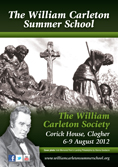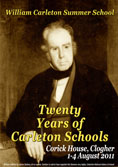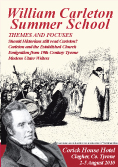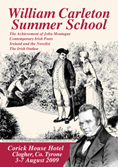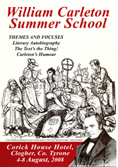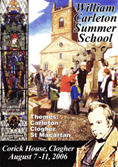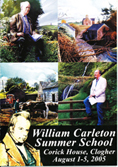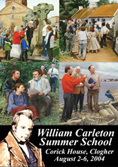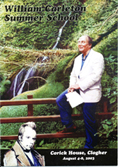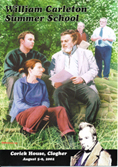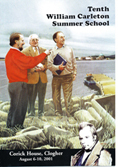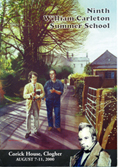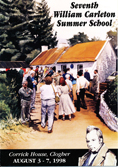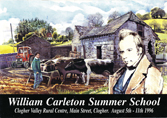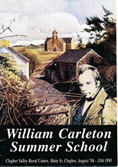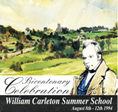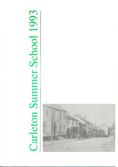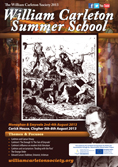Thomas Davis (1845)
Carleton is the historian of the peasantry rather than a dramatist. The fiddler and piper, the seanachie and seer, the matchmaker and dancing master, and a hundred characters beside, are here brought before you, moving, acting, playing, plotting and gossiping. You are never wearied by an inventory of wardrobes, as in short English descriptive fictions…you see how everyone is dressed; you hear the honey brogue of the maiden, and the downy voice of the child,…and the troubled gush of men’s anger. The moory upland and the corn slopes, the glen where the rock juts through mantling heather, and bright brooks gurgle amid the scented banks of wild herbs, the shivering cabin and the rudely-lighted farm- house, are as plain in Carleton’s pages as if he used canvas and colours with a skill varying from Wilson and Poussin, to Teniers and Wilkie...Endowed with the highest dramatic genius, he has represented their love and generosity, their wrath and negligence, their crimes and virtues, as a hearty peasant—not a note-taking critic...He has created ideal characters, that give him a higher rank as a poet (some of them not surpassed by even Shakespeare for originality, grandeur and distinctness); but here he is a genuine seanachie, and brings you to dance and wake, to wedding and christening—makes you romp with the girls, and race with the boys—tremble at the ghosts, and frolic with the fairies of the whole parish. Come what change there may over Ireland, in these tales and stories the peasantry of the past hundred years can be for ever lived with.
Charles A. Read (1880)
William Carleton the Walter Scott of Ireland,' as he was not unjustly called by O' Connell was born at Prillisk, County Tyrone, in 1794. Several writers have placed his birth four years later, but the earlier date is the correct one. He was the youngest of fourteen children. His parents were in very humble circumstances; for they had to support themselves and their large family on a farm of but fourteen acres. Carleton, in fact, was born a peasant. His parents, however, though thus poor in material gifts, appear to have been rich in intellectual endowment, and to their early influence Carleton owed much of his after success. He himself has drawn the portraits of his father and mother; and though we may see the partiality of filial affection in the pictures, they bear, at the same time, the proof of fidelity to truth.
W.B. Yeats (1891)
The true peasant was at last speaking, stammering, illogically, bitterly, but nonetheless with the deep and mournful accent of the people. He at first exaggerated, in deference to his audience, the fighting, and the dancing, and the merriment, and made the life of his class seem more exuberant and buoyant than it was.. .As time went on, his work grew deeper in nature, and in the second series of Traits and Stories of the Irish Peasantry he gave all his heart to 'The Poor Scholar', 'Tubber Derg', and 'Wildgoose Lodge'. The humorist found his conscience, and, without throwing away laughter, became the historian of his class.
Sir Shane Leslie (1930)
Though he wrote for hire and abused every class and creed in turn, yet genius will out, and Carleton lives because he had already lived so much that he described. Compare Carleton with every contemporary that attempted to dip his pen in Irish gall or gaiety. Miss Edgeworth's finished artistry pales before his rich torrential canvas, and she never found herself very far beyond the Castle and the Hall. Lever dissipated himself for a perennial after-dinner audience. Lover was Lever running to seed. Lady Morgan was an ambitious Miss Edgeworth. Mrs. Hall wrote for a Baedeker unborn. None of them had ever lived in a cabin or known Irish as a spoken tongue.
Benedict Kiely (1947)
He (Carleton) had his credit for it (literary oeuwe); not much money, for he was a bad man at business; not much worldly comfort, beyond the fragrance of poteen punch, or the beauty of rivers and mountains and green fields, or the love and contentment of his own hearth. But he had praise from great men who were few, from small men who were many, and from some blame and bitter words.
John Montague (1952)
Carleton stands alone in his period because he was the first Irish writer to discover the ordinary people of Ireland; the first, who having lived as a boy in the cabins and pretended work in the fields, later turned to them for his subjects. Although influenced by the patriotic rediscoveries of the Nation group, his achievement was on a much larger scale, because he stood out like a giant among them; almost singlehanded he effected a literary discovery of the Irish people.

